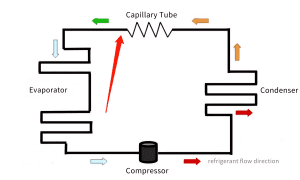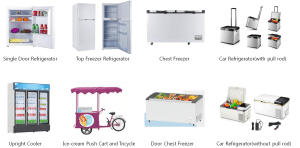How does a solar refrigerator work?
The working principle of traditional refrigerators is based on thermodynamic principles. It mainly realizes energy conversion through the circulation and state changes of refrigerants, thereby achieving the purpose of cooling.
The entire process mainly includes the following steps:

- Compression: The compressor compresses the refrigerant into a high-temperature and high-pressure gas and enters the condenser.
- Condensation: These gases release heat in the condenser and condense into a normal-temperature and high-pressure liquid.
- Throttling: The high-pressure liquid passes through a drying filter for filtration to remove moisture, impurities, and oxides. Through a throttling device (such as an expansion valve or capillary tube), the pressure and temperature are reduced, and it turns into a low-temperature and low-pressure liquid and enters the evaporator.
- Evaporation: In the evaporator, the refrigerant absorbs the heat inside the refrigerator and evaporates into a gas, thereby achieving the refrigeration effect.
- Circulation: The low-temperature and low-pressure gas is sucked in by the compressor again, and this refrigeration process is repeated in a cycle.
The solar refrigerator is similar to the traditional refrigerator in the core refrigeration cycle part of the working principle. However, their biggest difference lies in the power supply method. Traditional refrigerators rely on mains power supply and need to be connected to the power grid to operate normally. On the other hand, solar refrigerators use solar energy to provide energy. Solar panels convert solar energy into electrical energy and directly supply power to components such as the compressor of the refrigerator. If equipped with a battery, electrical energy can be stored in the battery.
What are the advantages of a solar refrigerator?
Environmental protection and energy saving
Solar energy is a clean energy source. Using a solar refrigerator can significantly reduce reliance on traditional energy sources, lower carbon emissions, and be environmentally friendly. In the context of the global advocacy of sustainable development, this advantage is particularly important.
Strong independence
It is especially suitable for camping picnics, remote areas, or places with unstable power supply. In these places, traditional refrigerators may not work properly due to power problems. As long as there is sufficient sunlight, solar refrigerators can continuously operate and meet the refrigeration needs of food.
Low operating cost
Although the initial purchase cost of a solar refrigerator may be relatively high, in the long run, it has almost no electricity bill expenditure. Traditional refrigerators need to continuously consume electrical energy. Over time, the cost of electricity bills cannot be ignored.
Does a solar refrigerator have a battery?
Some have batteries while some don’t.
Refrigerators without batteries are usually used when there is abundant sunlight. They utilize solar energy for immediate cooling. Without sunlight, they cannot cool. They can be used for short-term refrigeration of items that are not very sensitive to temperature, such as refrigerating beverages during outdoor picnics.
Solar refrigerators with batteries are mainly designed to deal with unstable solar energy supply. For example, at night or on cloudy days when solar panels cannot work properly, the battery can use the stored electrical energy to provide power and ensure the continuous operation of the refrigerator. This is very important for users who need a stable refrigeration environment, such as storing medicines or fresh meats, seasonal vegetables and other foods.
Can a solar refrigerator be generated by the main power?
Some can and some cannot.
Solar refrigerators can be designed to be powered by mains electricity. When there is no sunlight or when there is a problem with the solar energy system, users can connect it to a mains electricity socket. In addition, some refrigerators are equipped with intelligent switches, enabling them to automatically switch to mains electricity output when the solar power is exhausted, ensuring the normal operation of the refrigerator and enhancing practicability.
However, there are also solar refrigerators that cannot be powered by mains electricity. These refrigerators are mainly designed for remote areas or outdoor environments. Their internal circuits are only adapted to solar direct current and there is no mains electricity interface or conversion circuit. They rely entirely on solar energy for cooling.
How long does a solar refrigerator last?
The service life of a solar refrigerator depends on various factors. Generally speaking, it can be used for more than 10 years.
From the perspective of components, a solar refrigerator with good compressor quality can have a service life of 10 to 15 years under normal use. The solar panel is also an important part. High-quality solar panels usually have a service life of about 20 to 25 years. In addition, some solar refrigerators are equipped with batteries. The service life of these batteries is usually several years, but the specific life depends on the battery type, usage conditions, and the number of charge and discharge cycles.
The usage environment also has a great impact on the service life. Appropriate temperature and avoiding direct sunlight can extend the life of the refrigerator. On the contrary, it will accelerate aging. In addition, maintenance is crucial. Regular cleaning and reasonable use (avoiding excessive and frequent opening and closing of the refrigerator door, etc.) can also help extend the service life of the solar refrigerator.
How Many Solar Panels Do I Need to Run A Refrigerator?
To know the number of solar panels required, the most important thing is that we need to determine the daily power consumption of the refrigerator and the power of the solar panel. First, calculate the daily power consumption of the refrigerator (power × duration), and then determine the daily power generation of the solar panel (power × effective sunshine duration). Divide the daily power consumption of the refrigerator by the daily power generation of the solar panel to estimate the number.
For example:
– Generally, the power of refrigerators used in ordinary households is around 100-800 watts. If the power of the refrigerator is 200 watts and it runs for 24 hours a day, then the daily power consumption is 200W × 24h = 4800Wh.
– The power of common solar panels on the market varies from 100 to 800 watts. Assuming a 200-watt solar panel is selected, under ideal sunshine conditions, the effective power generation time per day is calculated as 6 hours. Then the daily power generation of one solar panel is about 200 watts × 6 hours = 1200 watt-hours.
– If the refrigerator consumes 4800 watt-hours per day and a 200-watt solar panel generates 1200 watt-hours per day, then the number of solar panels required = 4800 ÷ 1200 = 4.
It should be noted that this is only a rough estimate. In actual situations, factors such as the peak output power of the solar panel, energy conversion losses, and the presence or absence of a battery also need to be considered. In some areas with poor sunshine conditions, more solar panels may be needed to meet the normal working requirements of the refrigerator.
What types of solar fridges do we have?


You may also be interested in pages below
- Alibaba – Gidita Life
- Ecer – Gidita Solar
- Amoy Brand – Gidita Solar
- Gidita Solar
- Solar System & Application FAQs
- Distinction Between Off-Grid, On-Grid, and Hybrid Solar System? No More Confusion, all in 1 Basic Article!
- The 4 Most Popular Solar Lights
- What is a solar lighting system? 6 Things You Need to Know About the Exciting Green Energy Lighting Solution!
- Why Balcony Solar Systems Become Booming All the World? Your Balcony can be a 100% Powerful Energy Hub!
- The Principle and Application of Solar Water Pumps: The Magic Power that Turns Sunlight into Water
- A Portable Power Station: Your Reliable Companion to On-the-Go Life Adventures! Learn All about A Portable Power Station in 1 article.


Xiamen Geno Industry Co,. Ltd.
Tel / WhatsApp: +86 13906057667
Email: cathy@geno-china.com
